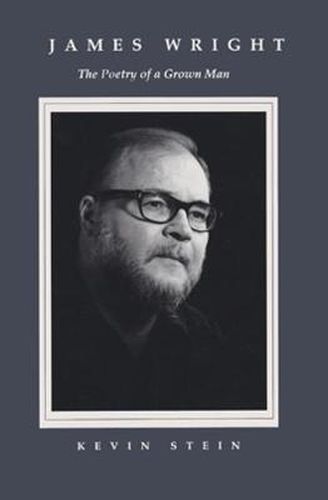Readings Newsletter
Become a Readings Member to make your shopping experience even easier.
Sign in or sign up for free!
You’re not far away from qualifying for FREE standard shipping within Australia
You’ve qualified for FREE standard shipping within Australia
The cart is loading…






Although some critics have identified two phases in the poetry of James Wright and have isolated particulars of his movement from traditional to more experimental forms, few have noted also the elements of constancy in the evolution of his poetry. In this first comprehensive scholarly introduction to Wright’s work, Stein traces the unified growth of Wright’s poetry, asserting that while stylistic changes are often more apparent than actual, Wright does undergo a continuing personal and aesthetic development throughout his career. Stein examines the entire body of Wright’s poetry, including such previously unpublished materials as the collection Amenities of Stone.
Stein locates Wright in the Emersonian tradition which sees struggle with language as a struggle with the self – a locating and defining of the self within a world of natural facts. Language, then, becomes a means of self-definition, and to be frivolous or irresponsible with language becomes a negation of the self and the world it inhabits. For Wright, \u201cthe poetry of a grown man\u201d issues from this understanding. Because Wright joins the act of language with the act of selfhood, it is not surprising that the mode and tenor of his work would alter as the self redefines its values and goals, its very identity. In fact, Stein divides Wright’s career into three interrelated stages of development: \u201ccontainment,\u201d in which he relies on traditional religious and rhetorical measures to distance himself from a world of experience; \u201cvulnerability,\u201d in which he enters the experiential world where the self is rewarded and equally threatened; and \u201cintegration,\u201d in which he accepts and balances the necessary combination of beauty and horror inherent in being human within a natural world.
Stein shows that throughout his career Wright’s presiding concern is to discover a way of writing and a way of life that might overcome the effects of an individual’s separation from the human community, the natural world, and the spiritual presence in the universe. In Wright’s world, to do less is to betray one’s language – and one’s self.
$9.00 standard shipping within Australia
FREE standard shipping within Australia for orders over $100.00
Express & International shipping calculated at checkout
Although some critics have identified two phases in the poetry of James Wright and have isolated particulars of his movement from traditional to more experimental forms, few have noted also the elements of constancy in the evolution of his poetry. In this first comprehensive scholarly introduction to Wright’s work, Stein traces the unified growth of Wright’s poetry, asserting that while stylistic changes are often more apparent than actual, Wright does undergo a continuing personal and aesthetic development throughout his career. Stein examines the entire body of Wright’s poetry, including such previously unpublished materials as the collection Amenities of Stone.
Stein locates Wright in the Emersonian tradition which sees struggle with language as a struggle with the self – a locating and defining of the self within a world of natural facts. Language, then, becomes a means of self-definition, and to be frivolous or irresponsible with language becomes a negation of the self and the world it inhabits. For Wright, \u201cthe poetry of a grown man\u201d issues from this understanding. Because Wright joins the act of language with the act of selfhood, it is not surprising that the mode and tenor of his work would alter as the self redefines its values and goals, its very identity. In fact, Stein divides Wright’s career into three interrelated stages of development: \u201ccontainment,\u201d in which he relies on traditional religious and rhetorical measures to distance himself from a world of experience; \u201cvulnerability,\u201d in which he enters the experiential world where the self is rewarded and equally threatened; and \u201cintegration,\u201d in which he accepts and balances the necessary combination of beauty and horror inherent in being human within a natural world.
Stein shows that throughout his career Wright’s presiding concern is to discover a way of writing and a way of life that might overcome the effects of an individual’s separation from the human community, the natural world, and the spiritual presence in the universe. In Wright’s world, to do less is to betray one’s language – and one’s self.